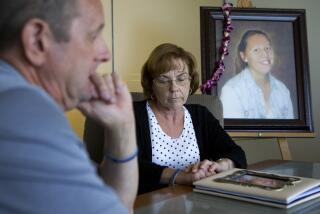Letters: Dying but not wanting to know
- Share via
Re “Prescribing silence,” Opinion, May 16
That Dr. Susan Partovi asked a patient if he wanted to know the details of his terminal illness is commendable. But relying on the old standby, “Do you want everything done?” — not so much.
The medical team has a responsibility to thoughtfully and compassionately explore both the benefits and burdens of end-of-life treatment options, many of which can lead to suffering, reduce quality of life and impede a peaceful death. As prognosis worsens, patients and families commonly fear abandonment and may choose aggressive intervention to ensure ongoing contact and care.
Medical professionals need to emphasize that care never stops, although the focus may shift to comfort and quality of life.
Anne Riffenburgh
South Pasadena
The writer is a licensed clinical social worker specializing in cancer and palliative care.
The case of Pedro, a man with esophageal cancer whose wife did not want him informed about his diagnosis, reminds me of the significant body of literature from the 1960s and ‘70s about keeping a childhood cancer diagnosis from patients. Parents sought to protect their children by keeping this secret and enlisting the help of nurses and physicians to go along.
Turns out that the children knew anyway, as researchers discovered, but kept the secret to protect their parents. As a professor of nursing and pediatric nurse practitioner, my own experience and research with children with HIV/AIDS supports this finding.
Disclosure should be viewed as a process, not a one-time-only event. It might have been helpful if Pedro had been asked, “What do you need to know about your illness?” more frequently.
Susan Instone
Del Mar
Partovi’s moving account of her experience reveals how ethical dilemmas confound physicians with increasing regularity.
Spectacular advances in medicine have endowed doctors with ever-more God-like powers. This means their decisions — particularly ones involving apportionment of limited medical resources, call for God-like wisdom.
The conundrums of end-of-life care will only become more baffling as our population ages. Heaven help our doctors.
Devra Mindell
Santa Monica
Before my mother died of cancer, my family begged the doctors at Johns Hopkins not to tell her the prognosis. Mom often told us how she had given our father a “good” year before he died of pancreatic cancer at age 44 by keeping his prognosis a secret. We wanted this for her.
The doctors ignored our pleas. There was no acceptance, no “getting affairs in order,” no fond farewells. Instead, our mother suffered months of debilitating depression and fear.
Partovi is compassionate and correct. Sometimes the family knows best. Physician, heal thy arrogance.
Susan Amerikaner
Camarillo
ALSO:
Letters: Vin’s voice a fan favorite
Letters: Addiction treatment that works
More to Read
A cure for the common opinion
Get thought-provoking perspectives with our weekly newsletter.
You may occasionally receive promotional content from the Los Angeles Times.






